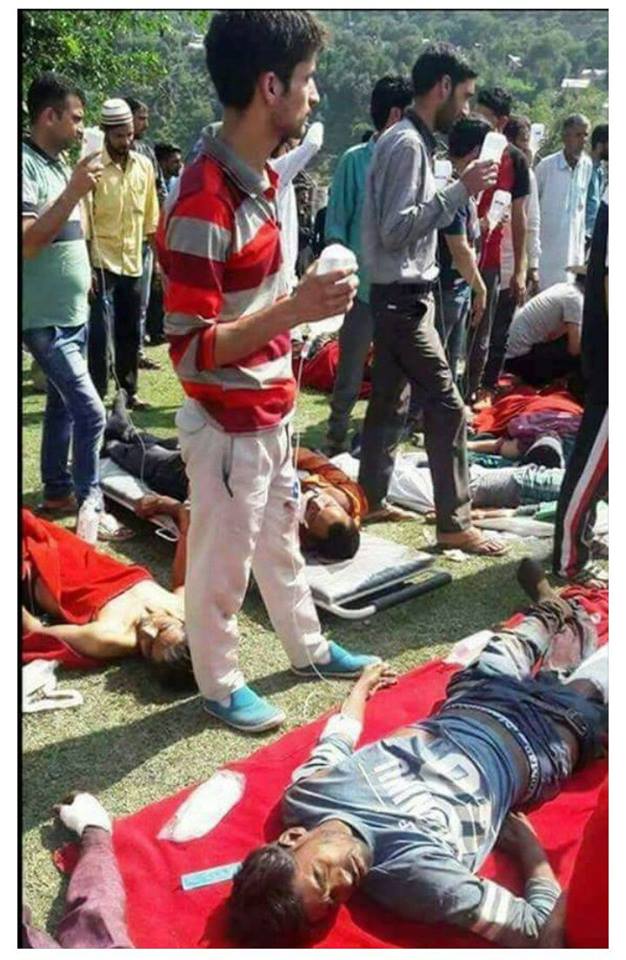
A heinous terrorist attack on 10 July killed seven Amarnath pilgrims in the Kashmir Valley. In an encouraging affirmation of humanity against hate, this attack has met with universal condemnation and protests by ordinary people from the Kashmir Valley to various Indian towns and cities.
The 10 July killings are the first such terrorist attack on pilgrims in the Kashmir Valley in 17 years. Even at the height of the Amarnath land row protests in 2008, as well as massive civilian protests in 2010 and 2016, pilgrims to Hindu shrines were never targeted. The incident therefore marks yet another ominous symptom of deterioration in the Kashmir situation under the PDP-BJP Government in the State and the Modi Government at the Centre.
The attack also reveals the hollowness of the Modi Government’s aggressive and belligerent claims on the ‘security’ front. In late June itself, the Inspector General of Police (Kashmir Zone) had, in a letter to security agencies, communicated a “most urgent” intelligence input warning of an attack on the Amarnath Yatra. The alert had warned that terrorists might fire on pilgrims’ vehicles to try and achieve “flaring of communal tensions throughout the nation.” In response, the CRPF authorities had assured of the “highest-ever security” arrangements for this year’s Yatra. How come, in spite of the warning and the elaborate security measures promised, a bus full of pilgrims was allowed to violate several security norms?
The chartered bus (the sale of which by one Gujarat-based owner to another was incomplete) was not registered with the Amarnath Shrine Board, as required by regulations. Yet it had been allowed to visit the Amarnath shrine. It was also traveling after sunset – another grave violation of regulations. It was not part of the official convoy of Yatris with security cover, but it was preceded by a police van. The J&K authorities have implied that the militants might have been aiming to fire at the police van rather than the pilgrims’ bus. But they have not yet explained how, even after an intelligence alert specifically warning of an attack on pilgrims’ vehicles, a bus full of pilgrims was allowed to travel in the area in violation of security measures. The Government of J&K, and the Central Government which controls security forces in the Valley, are squarely responsible for this grave lapse of security that has resulted in the killing of 7 pilgrims. The J&K Police has issued various contradictory explanations and theories about the attack. A credible and independent investigation is called for to identify the perpetrators.
Whosoever the perpetrators of the attack, there can be little doubt that one of the purposes of such an attack is to foment communal tension all over India. The intelligence alert warning of the attack itself warned of this outcome. Rebuffing attempts to foment such communal tension and hate-mongering in the wake of the attack ought to be of the utmost importance. Kashmiri people have taken a lead in this crucial task.
In the wake of the 10 July terror attack, Kashmiri civilians rushed to provide blood to the injured survivors. Kashmiri civil society groups organized a protest against the attack in Srinagar, expressing abhorrence and condemnation of the killings. Parents of Kashmiri youth killed by police and paramilitary forces for protesting on the streets of Kashmir in 2010 held a protest in solidarity with the victims of the Amarnath killings, expressing empathy with the pain of the victims’ loved ones. In Delhi and other parts of the country, those who had protested to say ‘Not In My Name’ to the spate of lynch mob attacks targeting Muslims, also protested against the killings of Amarnath Yatris. These expressions of humanity went far to counter the attempts by vested political interests to fan up hate. Citizens came forward to rebuff and protest every kind of communal attack, regardless of the religious identity of the victims. In stark contrast, however, was the bias displayed in Prime Minister’s response. Prime Minister Modi befittingly expressed prompt sympathy and grief for the Hindu victims of the Amarnath attack – but this served to underline his pointed failure to express similar sentiments for the Muslim victims of various Hindutva outfits.
Various hate-monger ‘trolls’ on social media – known for their aggressive support for the Prime Minister – called for ‘culling’, extermination and burning alive of Kashmiris as revenge for the attacks. Home Minister Rajnath Singh, displaying a sense of responsibility that is rare for a member of the Modi Cabinet, soberly rebuffed one such hate-mongering remark. His sober tweet, instead of being praised and echoed, was met with radio silence by his colleagues including the Prime Minister, even as the Sanghi hate-mongers trolled him viciously.
People all over India had praised the courage of the driver of the pilgrims’ bus, Shaikh Saleem, for keeping his head in the face of firing and saving the lives of most of the pilgrims. A couple of Gujarat-based newspapers, aided by various online hate-mongers, tried to slander the driver, spreading fake news accusing him (as a Muslim) of being a suspect in the attacks and claiming that in fact a Hindu man was responsible for saving pilgrims’ lives.
Meanwhile some irresponsible TV channels, instead of doing their job and seeking answers from the Government on the terror attack, instead tried to whip up slander and hatred against human rights activists, ‘Not In My Name’ protesters and Left activists for the attack!
It is imperative that the people of India and of the Kashmir Valley continue to resist and defeat the forces that are attempting to foment communal tension and hatred in the wake of the Amarnath attack. They must also demand a credible investigation to identify and punish the perpetrators of the attack and hold the Governments of the day accountable for security lapses that have allowed the attack to succeed.
